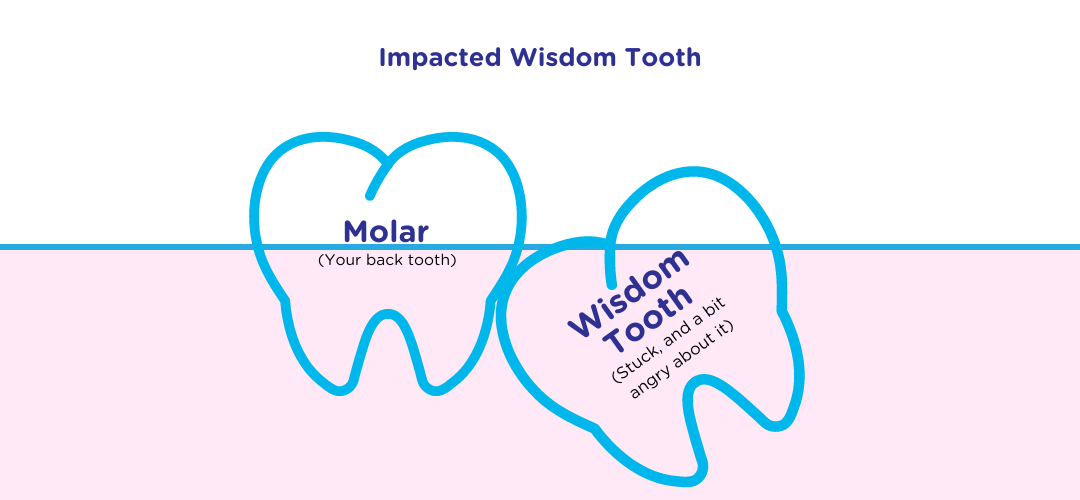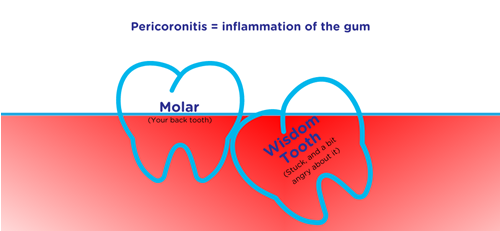Your 101 Guide to wisdom teeth removal

Despite their name, it doesn’t seem very wise of our bodies to grow wisdom teeth. They hurt when they come through, they can get infected and inflamed once they’ve emerged, and often they need to be removed, which can be scary.
It’s disorientating when your teeth ache, and there’s a lot of information out there about what you should and shouldn’t do, along with horror stories, old wives' tales and Chinese whispers.
I’ve learnt a thing or two about caring for Wisdom Teeth patients over the years, having spent several years performing Oral Surgery for the NZ Defence Force. So, here’s the Wisdom Tooth 101 of everything you need to know to make an informed choice about what to do when your wisdom hurt.
Understanding the Dental Jargon about Wisdom Teeth
You’ll have to forgive us Dentists, we have a habit of using confusing words for simple things. There are some phrases you may hear if you’re researching wisdom teeth, and what they mean in real human words.
What does "erupting wisdom teeth" mean?
Calm down, nothing is about to blow... An erupting wisdom tooth simply means that your wisdom tooth is growing up and out of your gum. It’s normal, and there shouldn’t be any lava to worry about.
What are "impacted wisdom teeth"?
Many people suffer from impacted wisdom teeth, and it does NOT mean they’ve been bashed in the face. We call them “impacted” because they have an impact on your other teeth – mainly your molars.
An impacted wisdom tooth is just one that can’t find its way up and out of your gum properly. Think of it as a tooth that wants to be free but is trapped; it’s pushing on everything it can to try to break free, but nothing will budge.

What is Pericoronitis?
If your wisdom tooth is impacted, it can easily lead to a condition called Pericoronitis. It can start for all sorts of reasons but, in short, this is an inflammation of the gums in the area around your wisdom tooth.
And I’ll be honest, it hurts.
Pericoronitis is one of the main reasons people have their wisdom teeth removed. Not only does it hurt, but because it can be brought-on by stress and during times when you’re not taking the best care of yourself. It nearly always rears its ugly head at the worst possible time, like right in the middle of exams, or when you’re under the pump at work.

My wisdom teeth hurt, what should I do?
First things first, don’t panic. It’s a totally normal thing and can be readily dealt with.
If you have pain in your wisdom teeth, book a visit to the dentist and expect to have an x-ray of the area. Why? Because a lot of the problems with wisdom teeth happen beneath the surface, or deep in between teeth, so an x-ray takes the guesswork out of giving you the best advice about what to do next.
Contact us if you want to talk about it now.
Wisdom teeth removal / extraction
If your wisdom teeth are causing you persistent pain, the best bet is often to have them removed or, in dentist jargon, extracted. Everyone knows someone’s great Aunt’s cousin’s Grandma who had a bad experience with wisdom tooth removal, but in the hands of an experienced dental surgeon or specialist, you’ll be in safe hands. That’s not to say it will be pain-free (I wish I could promise that) but you will be getting the best care you can.
Should I have all my wisdom teeth removed at once?
If your wisdom teeth are causing you pain, and they are all emerging, it is a pretty common choice to have them all removed at the same time. Why? If you have them removed one by one over time, you’ll need some time off to recover from each of them, and for many people, it’s just easier to get it over and done with in one go.
But, this is where it pays to know your options for pain relief.
Wisdom tooth removal with local anaesthetic
Local anaesthetic makes a small area of your body go numb so you can’t feel pain in the area. General anaesthetic will put you completely to sleep, and can only be done by an anaesthetist.
Removing wisdom teeth with local anaesthetic does limit the amount of direct pain you can feel when it’s going on, but you will still fully awake and aware of what the dentist is doing. Think of drilling noises, tugging and yanking, and... you get the picture. You can’t feel the tooth or your gum, but it’s the kind of thing that makes people fear a trip to the dentist – and I get it. It is not my preferred way of doing it. I prefer when my patients aren’t terrified of me 😊
Wisdom tooth removal with sedation
Now imagine your face is still numb, you don’t really have any sense of time, and you’ll probably forget the whole thing...
That’s what having your wisdom teeth removed under sedation is like.
You’re still awake, but really drowsy, and if your dentist says “Hey John?” you’d still respond with a “Yep? What?”, but once the process is over, you'll hardly remember it, and it will feel like it happened so quickly you barely noticed it.
Sedation is by far my preferred method of wisdom tooth removal for the simple fact that my patients have a much more relaxed experience because of it. If I were having mine removed again, it’s how I would have it done.
Who can give sedation for wisdom tooth removal?
Not just every dentist. Giving patients sedation requires additional, specific training.
How long does wisdom tooth removal take?
Using sedation, it typically takes around an hour and a half to remove four wisdom teeth in one sitting. But the good news is, because of the sedation, it will feel like no time has passed at all and the experience will be behind you.
How long should I take off work after wisdom teeth removal?
Everyone is different, but typically speaking it’s usually about 2-3 days before you’re back to work or study. The full healing process can take up to a few weeks, but the best way to start this is by giving yourself a good few days to recover without interruption if you can.
What should I do about my wisdom teeth?
If your wisdom teeth are causing you pain, the best bet is to visit your dentist. Our process at The Dentists is very open; our job is to provide you with the knowledge and support to make the right choice for your oral health, then help you achieve it.
After performing 1,000’s of wisdom tooth removals in my time as dental surgeon for the NZ Defence force, I now call Napier home. Our practice in Taradale is wonderfully kitted out and incredibly comfortable for patients looking for the calmest possible way to have their wisdom teeth looked after.




